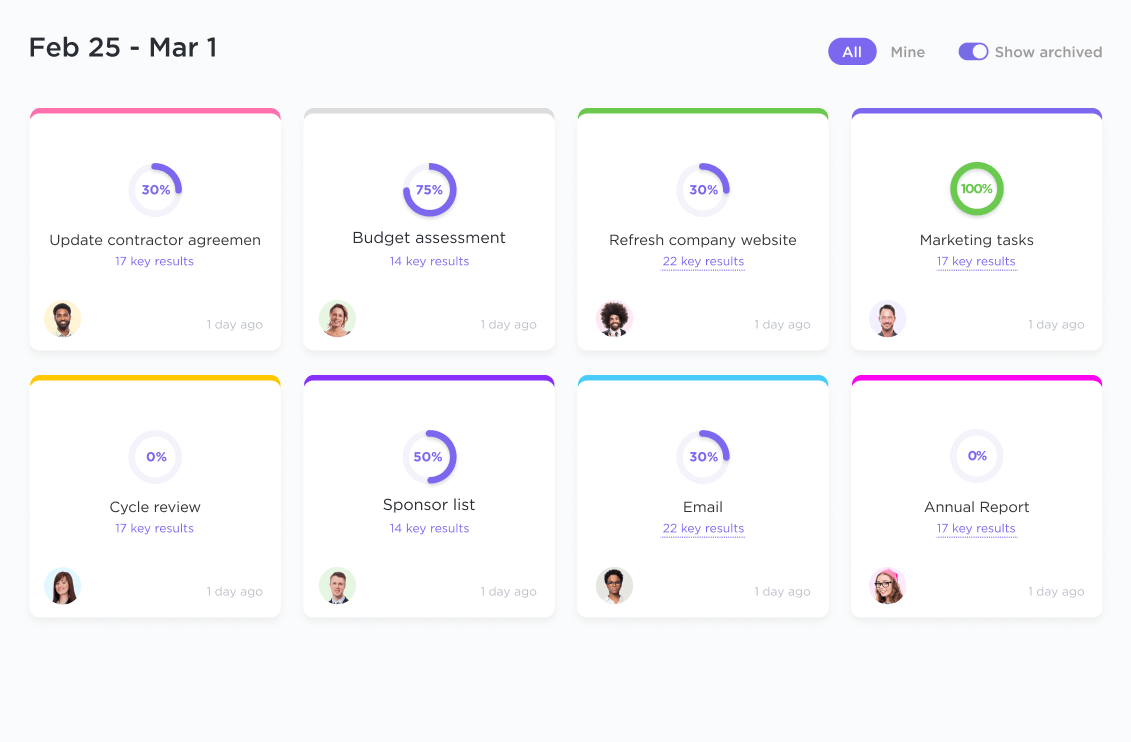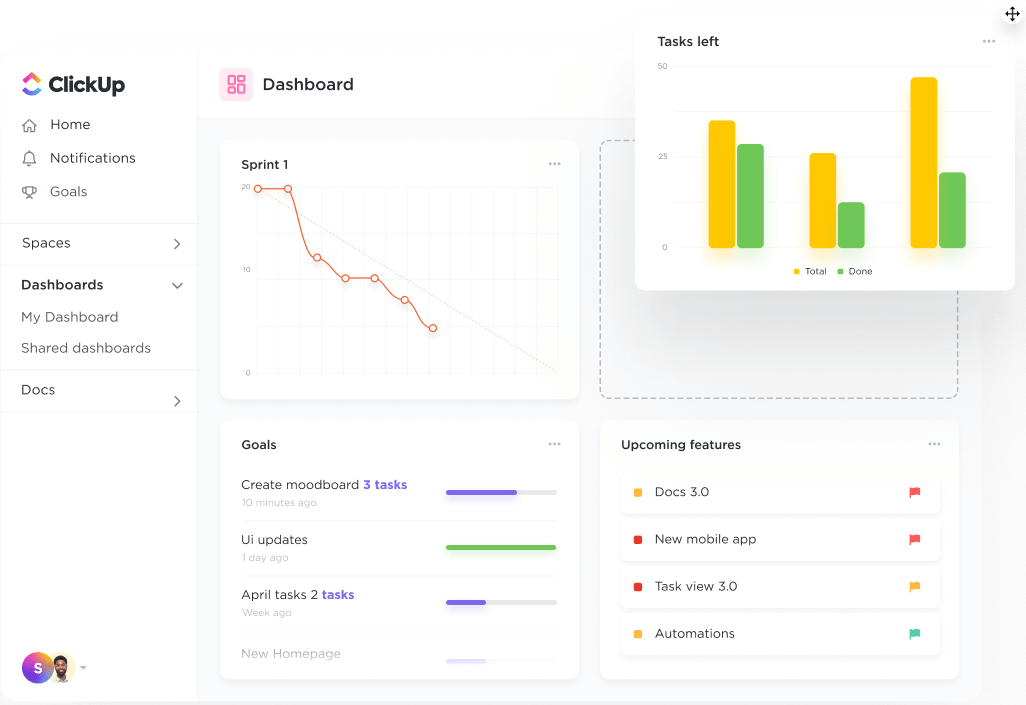

Have you ever looked at your to-do list and thought could we fast forward the program planning and go straight to the part where we celebrate?
We hear you and understand why program management sounds like it takes more out of your work day than it gives. If you’re spending time, money, and resources in the wrong ways, it’s a looming possibility. But we won’t let this happen.
Instead, we’ll show you how to reframe your approach to scale and manage your programs.
Often mistaken for project management, program management has a strategic distinctness and it deserves its moment! So how do we tell a program from a project? Which programs make sense to pursue? What’s the value of programs to an organization, its people, and its customers?
You have questions, and we have the answers! Let’s unpack how programs are different from projects, the role of a program manager, and tech stack essentials for program management success!
What is program management?
Program management is strategizing and coordinating programs to achieve initiatives and deliver change to an organization. A program is a collection of related projects, processes, and activities managed as a group to accomplish a common objective.
You’re wondering, “if I swap out the word program with project in your definition, it also means the same thing…your move.“
If we treat programs the same as projects, we’ve already created our first obstacle. Here’s why:
You (the project manager) are a captain of a boat (the project) overseeing operations and reaching the destination on schedule. Surrounding you are other boats (projects) with their captains (project managers). Would it be feasible for you to manage all ships and their operations and schedules? Not likely.
Try out our program management templates!
Program management Vs. Project Management
So what is the difference between program and project management? A project is concerned with its route and resources to the destination. A program goes beyond traditional project responsibilities and focuses on what happens after the projects reach their destination. The benefits, transformation, and change to the organization. ✨
The life cycle for a program
With this in mind, what does the life cycle look like for a program? For starters, there are three main phases to consider here, including:
- Program conceptualization phase. Stakeholders and executives come together to produce a program brief covering the vision, scope, minimum objectives, budget estimation, resource management, and benefits. The brief is passed to the program manager to identify program contributors, project dependencies, risk factors, scheduling, and tech requirements
- Program delivery phase. Delivery has a double meaning. The first meaning is delivery outcomes carried out by the project teams. The second meaning is the transition period, where the integration and change happen in the organization
- Program closure phase. Programs last for as long as an organization benefits from its value. But before it goes off without its training wheels attached, it has to go through multiple checks and instructions to sustain itself. Project teams disband, cost savings are evaluated, and program information is saved as organizational assets for future improvements (or other programs)
Let’s look at a few examples of programs relevant to any industry:
- Process gateway program to support complex software engineering problems
- Talent and culture program to elevate employee careers to the next level
- Onboarding client program to educate sales managers
- Accessibility program to guide the product design system
- Growth program to build and train international teams
It’s not scalable for these business initiatives to exist in a single project. Remember our boat analogy?
At its core, a program involves more functions outside the scope of a one-and-done project, thus requiring specialized people to own the development and ongoing governance of a program.
Program managers have entered the chat.
What does a program manager do?
The heart of every program ecosystem is the program manager. Their day to day priorities includes:
- Ask clarifying questions to scope business problems and define what success looks like
- Provide top-level navigation to help project teams make informed decisions
- Manage the program pace, so measurable outputs are delivered regularly
- Focus on the overall health of a program
Often, a program manager doesn’t have direct authority over project managers and program contributors. If you think about it, a program includes all different types of teams: Marketing, Sales, Recruiting, Customer Enablement, IT, Human Resources, etc. These teams specialize in their field, and the program manager provides the long-term strategy to keep all teams aligned on program objectives and deliverables.
The thing is, a program manager may not have all the answers right away. If you’re tackling something never been done before in your industry or organization, there are extraordinary levels of ambiguity. And programs are primarily vague at the beginning. Here’s a real example of a program:
The first sentence alone is packed with questions. No, all the questions: How do we discover storytellers? What are our criteria for a storyteller? What is the scope of these experiments? Will these new workflows require help from our core team?
Program managers start with what they know and form a picture of the rest as they go. Since they’re not in the weeds for every project (again, think about our boat analogy), they rely on project managers to provide tactical support. At a high level, program managers:
- Practice agile methodologies within the program ecosystem to reach business goals
- Apply principles, processes, and subject matter expertise to achieve results
- Be a thought leader to solve complex queries and mitigate risks
- Create the program budget, scope, and quality standards
- Align or realign project deliverables to program outcomes
- Use metrics to regularly inform and engage stakeholders
- Manage interdependencies between projects
- Eliminate duplicate or unneeded efforts
- Examine incoming program proposals
- Maintain program documentation
How about a few more program examples? ⬇️
Tips for successful program management
From start-ups to seasoned businesses, the steps it takes to turn ideas into actual organizational results feel overwhelming. How much, how soon, and how do you make a program work? Here are three tips to apply today for successful, impactful programs.
Tip 1: Encourage teams to speak their minds early and often
The quality of our human skills makes us better performers and leaders.
Read that sentence again.
We established earlier some program managers don’t have direct authority over teams. But they do have responsibility for the progress and outcome of the program. So many good things come out of encouraging teams to speak their mind early and often:
- Impending bottlenecks are called to attention and effectively resolved
- Diverse perspectives spark creative solutions to complex problems
- Members are given actionable feedback to improve
- Trust is built organically
A program’s success is dependent on teamwork. It’s vital to communicate this from day one of the program life cycle, but it’s never too late to start. So if you’re looking for practical advice to build effective teamwork, we got you covered!
Tip 2: Fully assess the program idea
Don’t take a few words exchanged for a program idea as the green light! Defining the program is the most critical stage in the program lifecycle because your organization’s energy, money, and resources will be spent on this large endeavor. So before you draft an email with your dream team CC’ed, take some time to think about what will come from this program.
- What business areas will the program affect? (Human Resources, Quality Excellence, Marketing, etc.)
- What are potential threats and consequences? (Disruption of organizational services, scope creep, misinformation, etc.)
- What will impact our systems, services, tools, and technology?
- Who is the target audience?
Tip 3: Use best-in-class program management software
What does best-in-class software look like? Competitive pricing plans and platform reliability? Absolutely, but for successful program management, you will also want:
- Powerful integration with other tools to bring data under one hood
- Solid task and project dependency functionality
- 360-view of all work across the company
Let’s unpack No. 3: 360-view of all work across the company. Do you know how many hours we lose a week context-switching and flipping between multiple tools? Qatalog and researchers at Cornell University’s Ellis Idea Lab did the math, and here’s what they found in the modern workplace:
5
The number of hours we lose a week trying to find information trapped in apps.
7 out 10
The proportion of people who report finding it time-consuming to find the information to do their job.
⅔
The number of people who report they’re not certain all departments use the same online apps.
Can you relate?
If your shoulders feel a little heavy, let’s turn things around!
I understand if you have software fatigue after trying Monday, Asana, Jira, and others. The first few weeks are great; then suddenly, teams are up against competing priorities, and projects stall.
3 ClickUp features you need for program management
ClickUp is the program management software your teams will want to use every day. With ClickUp, they are in control of optimizing their productivity while working collaboratively to achieve the program initiatives. Here are three must-have ClickUp features to run your program:
1. ClickUp Goals to link every task to the program deliverables
“ClickUp Goals help keep the focus of each and every department member on what’s really important, which is critical when the new product is being launched.”
Darya
HYPERVSN

2. ClickUp Dashboards to show the data story

“The use of Clickup has helped us most, especially with saving time. We used to use a system where at the end of the week, every team member sends in weekly reports via email, which would be analyzed over the weekend. But with Clickup, we are gradually phasing out redundant reports, thereby saving time, which are now channeled to more productive activities.”
3. 15+ customizable views to visualize tasks and workflows
“Even though these features look very minute on the surface, they play a huge role in plugging the gap for us, given the fact that our teams work remotely. With three different Views in ClickUp, our clients and managers have a 360-degree view of what’s happening at the ground level, allowing them to focus more on strategy and creative thinking compared to the mire of managing tasks and team.”
Joshua Rozario
Mindshare Digital
Program Management Examples at ClickUp
We get asked often if we at ClickUp use ClickUp to manage our programs. Frankly, it’s a favorite question because it reminds us how powerfully the platform handles both the mundane tasks and complexities so we get in a position to scale.
All of our work is interconnected. We work out of the same project Lists and make informed decisions as a team. Everyone has access to centralized information to get their work done.
Here’s a look at a few ClickUp programs launched which took many program managers and all the available cold brew to make it a success. Team, can you help me out here?
ClickUp expands senior EMEA team with European demand up 233%
ClickUp University, a free online learning platform
LevelUp by ClickUp (2021 edition)
The success of our programs wouldn’t have been possible without the diverse group of program managers and teams to communicate requests and share feedback fast and efficiently. And we want the same for you. 🤝
Take on your biggest organizational goals with ClickUp
ClickUp is an all-powerful software to coordinate your big ideas, see progress in real time, and manage your projects with full visibility. With ClickUp and program management in place, you’ll nurture a healthy, high-functioning team from day one!
Our team is here to help if you have a specific use case and need support through it. Honestly, we can talk about programs allll day and love to meet others who do too! 👋







